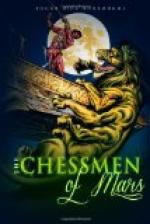Ghek had never seen an ulsio, since these great Martian rats had long ago disappeared from Bantoom, their flesh and blood having been greatly relished by the kaldanes; but Ghek had inherited, almost unimpaired, every memory of every ancestor, and so he knew that ulsio inhabited these lairs and that ulsio was good to eat, and he knew what ulsio looked like and what his habits were, though he had never seen him nor any picture of him. As we breed animals for the transmission of physical attributes, so the Kaldanes breed themselves for the transmission of attributes of the mind, including memory and the power of recollection, and thus have they raised what we term instinct, above the level of the threshold of the objective mind where it may be commanded and utilized by recollection. Doubtless in our own subjective minds lie many of the impressions and experiences of our forebears. These may impinge upon our consciousness in dreams only, or in vague, haunting suggestions that we have before experienced some transient phase of our present existence. Ah, if we had but the power to recall them! Before us would unfold the forgotten story of the lost eons that have preceded us. We might even walk with God in the garden of His stars while man was still but a budding idea within His mind.
Ghek descended into the burrow at a steep incline for some ten feet, when he found himself in an elaborate and delightful network of burrows! The kaldane was elated. This indeed was life! He moved rapidly and fearlessly and he went as straight to his goal as you could to the kitchen of your own home. This goal lay at a low level in a spheroidal cavity about the size of a large barrel. Here, in a nest of torn bits of silk and fur lay six baby ulsios.
When the mother returned there were but five babies and a great spider-like creature, which she immediately sprang to attack only to be met by powerful chelae which seized and held her so that she could not move. Slowly they dragged her throat toward a hideous mouth and in a little moment she was dead.
Ghek might have remained in the nest for a long time, since there was ample food for many days; but he did not do so. Instead he explored the burrows. He followed them into many subterranean chambers of the city of Manator, and upward through walls to rooms above the ground. He found many ingeniously devised traps, and he found poisoned food and other signs of the constant battle that the inhabitants of Manator waged against these repulsive creatures that dwelt beneath their homes and public buildings.
His exploration revealed not only the vast proportions of the network of runways that apparently traversed every portion of the city, but the great antiquity of the majority of them. Tons upon tons of dirt must have been removed, and for a long time he wondered where it had been deposited, until in following downward a tunnel of great size and length he sensed before him the thunderous rush of subterranean waters, and presently came to the bank of a great, underground river, tumbling onward, no doubt, the length of a world to the buried sea of Omean. Into this torrential sewer had unthinkable generations of ulsios pushed their few handsful of dirt in the excavating of their vast labyrinth.




